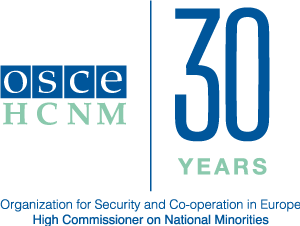Cooperation between OSCE High Commissioner on National Minorities and ECMI to be strengthened in 2023

The ECMI was created as an international institution, intended to network and operate across the European region broadly defined. One aspect of this is a tight connection to European policy institutions related to minority affairs. This relationship starts with having high-level representatives from the European Parliament, the Council of Europe, and the Office of the High Commissioner on National Minorities (HCNM) of the OSCE on the ECMI’s Executive Board.
At the same time, the ECMI gives back to these institutions by contributing to their policy-making processes either by participating in their consultative bodies or providing specialised policy analyses. Amongst the former are the Council of Europe’s Steering Committee on Anti-Discrimination, Diversity and Inclusion (CDADI) and its Committee of Experts on Roma and Traveller Issues (ADI-ROM). In both bodies, ECMI experts are accredited as regular participants.
Equally, for the OSCE High Commissioner on National Minorities, the ECMI has produced reports on the socio-economic participation of national minorities, including a 2021 comparative analysis of OSCE member-state policies in this realm. In 2022, experts from the ECMI were selected to be part of a special HCNM working group to develop this topic further. For 2023, the ECMI will contribute to the launch of a new set of HCNM recommendations on socio-economic participation.
As a kick-off event for the 30th anniversary of The Office of the High Commissioner on National Minorities (HCNM) of the OSCE this year, the ECMI has been asked to host an Expert Meeting (May 23) to examine the three decades of the HCNM’s work.
The discussions will be focused on three themes: the HCNM as a persona, the HCNM as a changemaker, and the HCNM as a norm-builder. Specially commissioned reports will look at each of these dimensions. The first will examine how the High Commissioners' personality and prior professional experiences have impacted their ability to carry out the “quiet diplomacy” called upon by the office.
Secondly, the Meeting will reflect on years of project work that the HCNM Office has implemented in several OSCE countries. These projects span topics such as independent media, integration policies, and multilingual education. Thirdly, a retrospective will be given to the nine sets of recommendations and guidelines that the HCNM has issued over the years, asking the question, what kind of added contribution have these documents given to the overall European minority rights regime?
The reports will appear as special ECMI publications and be available by mid-summer. They will constitute a new pillar in research on the HCNM while examining new challenges for the institution in an era of renewed geopolitical tension and conflict in Europe.

